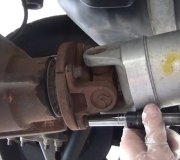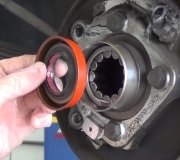Hi hazelj04. Welcome back to the forum. Problems like this are real difficult to diagnose when we aren't there to feel it ourselves, but of all the noises and vibrations I can imagine, I can't think of an easy culprit to find. There are two tools I can think of that might help. The first one is called a Chassis Ear. It is used with noises you can hear. This tool consists of six microphones that you clip onto various suspect points, then you switch between them while driving and listening with headphones. You can move the microphones around to localize the source of the noise. Many mechanics have never heard of this tool but it is available from Mac Tools, (I think the model number is ET7600, or something like that), and from other tool truck guys. It was issued to Chrysler dealers too. That's where I became familiar with it and I used it a bunch of times. It costs $199.99 from Mac Tools. The microphones are connected with wires to the receiver box. There is a newer model that uses four wireless microphones and two with wires. That model costs twice as much.
If the grinding is something you feel rather than hear, Chrysler had a tool for measuring vibrations. We rarely needed to resort to using it so I'm not familiar with it other than what I was told at a training school. As I recall, it was connected to the scanner and the probe or sensor was placed somewhere that it could sense the vibrations. It measured the frequency of the vibration and compared it to wheel speed so you could look at items that matched that frequency in operation. A vibration that matched wheel speed would be related to an out-of-balance tire, broken tire belt, or bent wheel. A vibration three times faster than tire speed would indicate driveshaft balance problems. Six times faster than wheel speed would typically be a tight u-joint problem. My understanding is it could even identify bearing problems inside the transmission based on the frequency and when different clutch packs were applied and when different things were spinning. U-joint problems will also change depending on rear ride height because it changes driveshaft angle. Transmission bearing problems will often get worse when you let off the gas pedal to cruise. Under load they tend to stop vibrating if the bearings are sloppy. Tight bearings, such as in u-joints, tend to vibrate worse under load because they aren't free to move.
I know this doesn't help identify the cause of the problem but those are some ideas. You might also try shifting out of overdrive to see if the grinding comes back at a lower speed.
Caradiodoc
Sunday, June 13th, 2010 AT 3:07 PM


